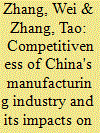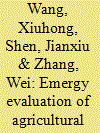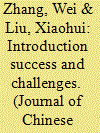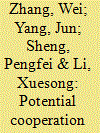|
|
|
Sort Order |
|
|
|
Items / Page
|
|
|
|
|
|
|
| Srl | Item |
| 1 |
ID:
066645


|
|
|
| 2 |
ID:
150469


|
|
|
|
|
| Summary/Abstract |
Uncovering the driving factors of CO2 emission intensity declining is important for China. This paper improves the logarithmic mean Divisia index technique, which includes energy density and energy consumption intensity, to explore the driving factors of carbon emission intensity (CI) in 29 Chinese provinces from 1995–2012. The main results are: (1) energy consumption intensity plays a more important role than carbon emission density (CD) for a rapid decrease in CI during the research period, so a much room is left for a significant CD reduction through carbon emission reduction technology, energy structural reduction, and energy consumption proportional reduction. (2) The decrease in energy consumption technology and energy structure in secondary industries contributes the most reduction in energy consumption intensity. (3)The energy consumption proportions of secondary and tertiary industries are the two most important drivers to decrease CD. (4) During the research period, the energy consumption proportions of secondary industries result in the most decrease in CD, whereas the energy consumption proportions of tertiary industries cause the most increase in CD.
|
|
|
|
|
|
|
|
|
|
|
|
|
|
|
|
| 3 |
ID:
185726


|
|
|
|
|
| Summary/Abstract |
This paper discusses the effect and mechanisms of digital economy (diec) on carbon emission performance (cop). Specifically, based on the panel data of 277 cities in China from 2011 to 2019, carbon emission performance and digital economy at the city level were evaluated through global super efficiency Epsilon-Based Measure (EBM) with unexpected output, and the vertical and horizontal scatter degree method, respectively. The OLS, mediation effect model, threshold model and spatial Durbin model (SDM) were adopted to investigate the nexus of diec and cop. The results show that: First, digital economy improves carbon emission performance, and this conclusion holds even after a series of robustness tests and endogenous treatment. The main impact mechanisms are energy intensity (ei), energy consumption scale (ec) and urban afforestation. And the effect and its impact mechanisms show regional heterogeneity. Second, under different levels of energy consumption structure, ei, ec, government intervention and urban afforestation, the impact of diec on cop is non-linear. Third, there's a spatial effect between diec and cop. The impact of diec on cop is significantly positive in local cities, while insignificant in the neighboring cities. Based on the above conclusions, specific recommendations are proposed for diec to improve cop.
|
|
|
|
|
|
|
|
|
|
|
|
|
|
|
|
| 4 |
ID:
153346


|
|
|
|
|
| Summary/Abstract |
It has been well established that better educated individuals enjoy better health and longevity. In theory, the educational gradients in health could be flattening if diminishing returns to improved average education levels and the influence of earlier population health interventions outweigh the gradient-steepening effects of new medical and health technologies. This paper documents how the gradients are evolving in China, a rapidly developing country, about which little is known on this topic. Based on recent mortality data and nationally representative health surveys, we find large and, in some cases, steepening educational gradients. We also find that the gradients vary by cohort, gender and region. Further, we find that the gradients can only partially be accounted for by economic factors. These patterns highlight the double disadvantage of those with low education, and suggest the importance of policy interventions that foster both aspects of human capital for them.
|
|
|
|
|
|
|
|
|
|
|
|
|
|
|
|
| 5 |
ID:
128382


|
|
|
|
|
| Publication |
2014.
|
| Summary/Abstract |
China's grain-for-green policy (GFGP) was implemented with the goal of improving ecological security. Consequently, agricultural energy and agrochemical inputs have been significantly increased to improve food security and to increase the income of farmers in the regions where the GFGP was implemented. In analysis of the sustainability of the agricultural system affected by the GFGP, it is essential to consider both economic profitability and environmental sustainability. Using Yanchi County as a case study area, this study used an emergy synthesis to examine the sustainability of the agricultural system before and after the GFGP in Northwest China. We found that the total emergy input and energy output of the agricultural system in the study area increased from 1991 to 2008; however, the sustainability of the system declined, and this decline was especially evident after the GFGP was launched in 2001. Increasing inputs of non-renewable purchased resources will not only reduce the effectiveness of the GFGP in Northwest China, but also hinder the implementation of the energy-saving and emission-reduction policy that China launched in 2005. We suggest that sustainable agricultural development in Northwest China should be based on effective use of renewable resources and development of a low-carbon agricultural economy.
|
|
|
|
|
|
|
|
|
|
|
|
|
|
|
|
| 6 |
ID:
121334


|
|
|
|
|
| Publication |
2013.
|
| Summary/Abstract |
As environmental problems in Mainland China are receiving global increasing attentions, environmental Kuznets curve (EKC) is adopted here to validate time route of improvement for its various areas. The results indicate that some areas, such as Shanghai, Tibet, Guizhou, Jilin and Beijing have overstepped their inflection points; Liaoning, Anhui, Fujian, Hainan and Qinghai have no inflection points, and meanwhile it is about seven years for the others areas take to reach their inflection points. Therefore, it is essential to lay down some policies to change or advance the process of reaching inflection point for each area respectively.
|
|
|
|
|
|
|
|
|
|
|
|
|
|
|
|
| 7 |
ID:
121342


|
|
|
|
|
| Publication |
2013.
|
| Summary/Abstract |
This paper investigated the causal relationship between energy consumption and gross domestic product (GDP) in China at both aggregated and disaggregated levels during the period of 1978-2009 by using a modified version of the Granger (1969) causality test proposed by Toda and Yamamoto (1995) within a multivariate framework. The empirical results suggested the existence of a negative bi-directional Granger causality running from aggregated energy consumption to real GDP. At disaggregated level of energy consumption, the results were complicated. For coal, empirical findings suggested that there was a negative bi-directional Granger causality running from coal consumption to real GDP. However, for oil and gas, empirical findings suggested a positive bi-directional Granger causality running from oil as well as gas consumption to real GDP. Though these results supported the feedback hypothesis, the negative relationship might be attributed to the growing economy production shifting towards less energy intensive sectors and excessive energy consumption in relatively unproductive sectors. The results indicated that policies with reducing aggregated energy consumption and promoting energy conservation may boost China's economic growth.
|
|
|
|
|
|
|
|
|
|
|
|
|
|
|
|
| 8 |
ID:
088463


|
|
|
| 9 |
ID:
136251


|
|
|
|
|
| Summary/Abstract |
China and the United States of America (US) are developing renewable energy concurrently. In this paper, we seek the opportunities for potential cooperation between these two countries based on the analysis of annual economic data. A mathematical model has been established to characterize correlations among GDP, carbon dioxide emissions, energy prices and the renewable energy cooperation index. Based on statistical analyses, such cooperation can promote economic development, reduce carbon dioxide emissions, improve the environment and realize green growth. If US monetary and technology resources and Chinese markets are combined, benefits can be mutually gained.
|
|
|
|
|
|
|
|
|
|
|
|
|
|
|
|
|
|
|
|
|